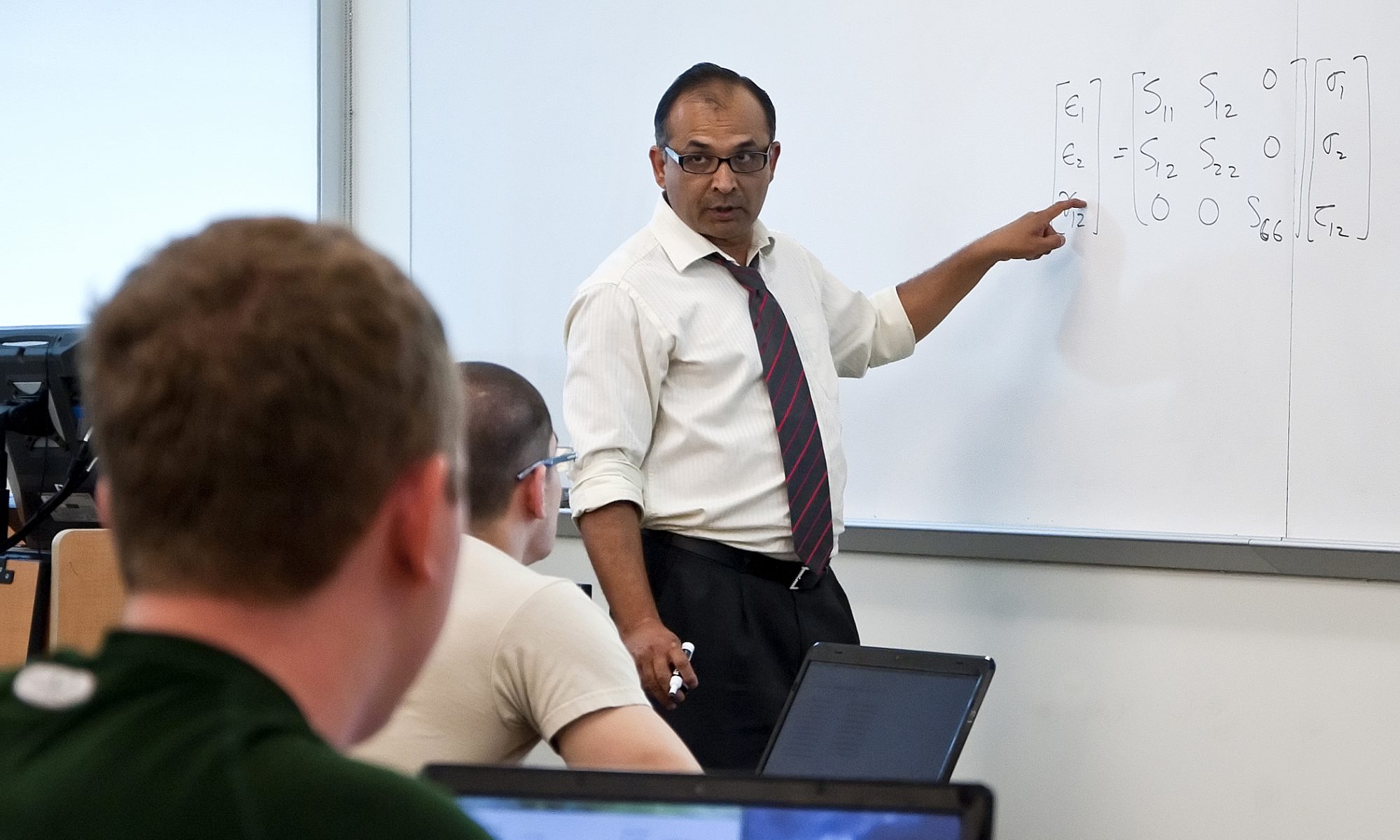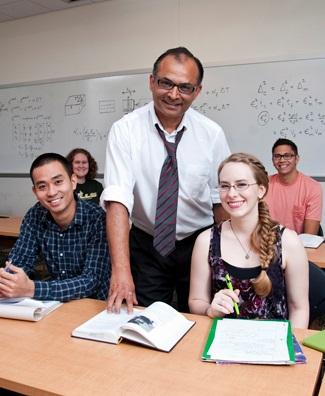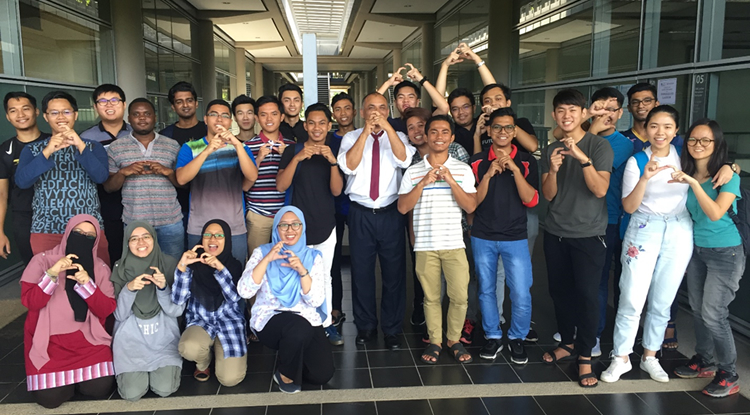AUTAR KAW is a professor of mechanical engineering at the University of South Florida. He is a recipient of the 2012 U.S Professor of the Year award from the Council for Advancement and Support of Education and the Carnegie Foundation for Advancement of Teaching. The award is the only national program to recognize excellence in undergraduate education.
| Professor Kaw believes that the most essential function of a university, including research universities, will continue to be on the learning side. As much as we need more qualified college graduates, we also need highly talented graduates to invent the next big thing – it could be an economic renewable energy resource or a cure for chronic diseases of the mind and body. If we want to truly create opportunities for our future generations, we have to first address the socioeconomic divide in our country. To address it for higher education while maintaining the current meritocracy which favors the wealthy, we as a society should fully sponsor the education of the top academic standing quartile who belong to the lowest income quartile families. After all, 17% of the brightest high school graduates in our nation do belong in that category.
Professor Kaw received his B.E. Honors degree in Mechanical Engineering from Birla Institute of Technology and Science (BITS) India in 1981, and his degrees of Ph.D. in 1987 and M.S. in 1984, both in Engineering Mechanics from Clemson University, SC. He joined the University of South Florida in 1987. Professor Kaw’s main scholarly interests are in engineering education research, adaptive learning, open courseware development, bascule bridge design, fracture mechanics, composite materials, and the state and future of higher education. Professor Kaw’s research has been funded by National Science Foundation, the Air Force Office of Scientific Research, the Florida Department of Transportation, Research and Development Laboratories, Wright Patterson Air Force Base, and Montgomery Tank Lines. Funded by National Science Foundation, under Professor Kaw’s leadership, he and his colleagues from around the nation have developed, implemented, refined, and assessed online resources for open courseware in Numerical Methods. This courseware receives 1,000,000+ page views, 1,800,000+ views of the YouTube lectures, and 100,000+ annual visitors to the Numerical Methods Guy blog. Professor Kaw has written more than 115 refereed technical papers, and his opinion editorials have appeared in the St. Petersburg Times, Chronicle Vitae, and Tampa Tribune. Professor Kaw’s work has been covered/cited/quoted in many media outlets, including Chronicle of Higher Education, Inside Higher Education, U.S. Congressional Record, Florida Senate Resolution, ASEE Prism, Tampa Bay Times, Tampa Tribune, WUSF, BayNews9, Fox13, WLRN, and Voice of America. Professor Kaw has received several national, regional, and university awards, including the 2012 U.S. Professor of the Year Award, the 2011 ASEE National Teaching Award, the 2004 ASME Curriculum Innovation Award, and the 1991 SAE Ralph-Teetor Award. Look at Professor Kaw’s curriculum vitae for complete details or visit |
DECEMBER 2025Released the open courseware for prior knowledge for five engineering courses, namely, Statistical Testing and Regression, Linear Circuits and Systems, Fluid Systems, Engineering Fluid Mechanics, and Computational Methods. SEPTEMBER 2025Quoted in Oracle about the new aerospace program at the University of South Florida. Read the article JUNE 2025“An Evaluation of Student Responses to a Fluid Mechanics Concept Inventory” was awarded the 2025 ASEE Mechanical Engineering Division Best Paper Award at the 2025 ASEE Annual Conference and Exposition in Montreal, Canada. Read the paper. MARCH 2025Selected as one of three semi-finalists for the Robert Foster Cherry Award. “The Cherry Award program is designed to honor great teachers, to stimulate discussion in the academy about the value of teaching, and to encourage departments and institutions to value their own great teachers.”
DECEMBER 2024Gave a keynote speech “The Simple Ways of Enhancing Student Learning in a Complex World” to attendees of Future of Education-Innovative Pedagogy, OBE & AI Training Program, Somaiya School of Engineering, Mumbai, India, December 9, 2024. APRIL 2024Received a grant on “Collaborative Research: Using Adaptive Lessons to Enhance Motivation, Cognitive Engagement, And Achievement Through Equitable Classroom Preparation“, $749,820 (USF Portion $383,172), May 2024-April 2027 (Lead PI). MARCH 2024 Published a journal paper on using multiple-chance testing: A. Kaw, R. Clark, “Effects of Standards-Based Testing via Multiple-Chance Testing on Cognitive and Affective Outcomes in an Engineering Course,” International Journal of Engineering Education, Vol. 40, (2), 2024, pp. 303-321. Presented a paper: A. Kaw, R. Clark, “Discussion Questions as Metacognitive Exercises,” at the ASEE-SE Conference, Marietta, GA, March 10-12, 2024.
|


 https://orcid.org/0000-0002-3976-6375
https://orcid.org/0000-0002-3976-6375 I believe that the classroom is not just an avenue for learning but also for meaningful social interaction. Treating students with respect and creating a vibrant atmosphere in the classroom is essential. The informal contact during office hours, in hallways, before class starts (I get to the classroom 15 minutes before starting time), immediately after class (I am willing to meet them outside the classroom), and at the student organization meetings is critical in building their interpersonal skills and in enhancing the human dimension to the faculty-student interaction. The latter is personally important to me, when in engineering, unlike other fields of study, faculty-student interactions “are less likely to be perceived as positive”, and “seniors are less satisfied with faculty and TAs than first-years are, although seniors interact with faculty and TAs more”.
I believe that the classroom is not just an avenue for learning but also for meaningful social interaction. Treating students with respect and creating a vibrant atmosphere in the classroom is essential. The informal contact during office hours, in hallways, before class starts (I get to the classroom 15 minutes before starting time), immediately after class (I am willing to meet them outside the classroom), and at the student organization meetings is critical in building their interpersonal skills and in enhancing the human dimension to the faculty-student interaction. The latter is personally important to me, when in engineering, unlike other fields of study, faculty-student interactions “are less likely to be perceived as positive”, and “seniors are less satisfied with faculty and TAs than first-years are, although seniors interact with faculty and TAs more”. The role of the connected world has helped me do this in more ways than one. From heading a search committee at the departmental level to answering questions from the Numerical-Methods-YouTube-channel subscribers, from being a reluctant keynote speaker at an education conference to facilitating an engineering education workshop, each contribution adds up synergistically in its own way.
The role of the connected world has helped me do this in more ways than one. From heading a search committee at the departmental level to answering questions from the Numerical-Methods-YouTube-channel subscribers, from being a reluctant keynote speaker at an education conference to facilitating an engineering education workshop, each contribution adds up synergistically in its own way.